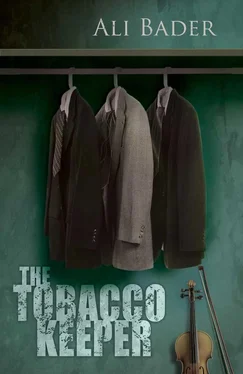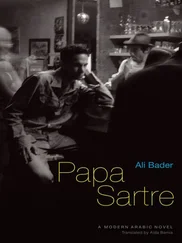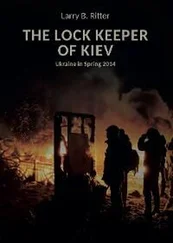We passed a pizza place, two Chinese restaurants and a McDonald’s. It wasn’t long till we reached Parson’s Pub. As we arrived, I saw a large tent pitched in a parking lot, which had clearly once been a petrol station. According to Faris, this was one of the most exciting places to relax in the Green Zone. It had a random assortment of Marines, politicians, interpreters and correspondents who came to cover press conferences. As we walked past the tent, we saw American women soldiers in camouflage gear smoking hookahs, their machine guns lying beside them. There were also contractors on the make, chuckling aloud while drinking their beer, and strategic-affairs experts in light desert boots, white shirts and khaki trousers. They drank beer and played Risk , the board game. Suddenly Nermine Haidar, who’d flown in with me earlier that day, emerged from among those seated. She came forward in her jeans and open blouse that revealed her round breasts. She shook hands with us.
‘So, you’re here!’ she said.
I asked her about the journalist who’d been with her.
‘Don’t know how I got rid of him,’ she said.
‘Well, we’re going to the bar to have a bite to eat and a beer, and later we’re going the Press Cooperation Agency and AC Media & News. Would you like to join us?’
She paused for a moment. ‘Fine, I’ll join you later!’ she said.
We went into the bar, which was in the shape of a hut and fairly dark inside. As soon as we’d entered the main door, a black South African guard approached us. His accent was hard to understand but he told us to write our names in the guest book. The bar was beautiful, like a neighbourhood bar in Los Angeles or Miami. There was a lounge full of tables and chairs, and a dartboard on the wall. An American employee was holding a glass of beer in one hand and throwing one dart after another. At the front was a wooden barrel with draught beer. The pub itself was huge and consisted of several rooms. There were a few black barmen standing behind the wooden bar, with all kinds of bottles of drinks behind them. On the right was a tiny back room, used as a store for whisky, vodka and wine that could be sold at almost twice their price outside the Green Zone.
Faris stood at the bar and ordered two beers, at two dollars each.
‘Are you going to write your book on Kamal Medhat while you’re here in Baghdad?’ he asked.
‘I’ll write the Baghdad part here,’ I said, wiping froth from my lips with a tissue, ‘but I have to drop by the agency first to collect some important documents.’
‘Is your role as a ghost writer?’ he asked.
‘No, not at all. The book will come out in my name this time,’ I said. He nodded in agreement. ‘You know, of course, that I’ve written many reports under other people’s names,’ I added, still wiping my mouth, ‘but this time, I want the book to be mine.’
Then I began, I don’t know how, to draw an analytical comparison between two images that obsessed my imagination at the time: the image of the tobacconist — or the tobacco keeper, as I called him — as presented in Pessoa’s poem, and that of the ghost writer. I told Faris that each of us has two distinct personalities: one that we are born with, like the character of the keeper of flocks in Tobacco Shop, and one that we acquire, like that of the protected man. But few can distinguish the second from the first, whether regarding name, age or life history. What is even rarer is someone capable of creating the character of Campos, the tobacco keeper, who treated the other two personalities so condescendingly. He travelled and brought back the tobacco, guarded it, smoked it and lived his life stimulated by its clouds of smoke. That day, discussing the poem with Faris was like a hallucination, especially since he hadn’t read it. ‘Read it!’ I said to him as I drank my beer and continued to rave. I told him that I believed the work of a ghost writer was totally different from that of the tobacco keeper. The latter was unique in being enriched by the other two personalities, while the ghost writer was always ground down by his role. The ghost writer represented total absence and existed on another unconnected plane, living an empty life in an absolute vacuum. No sooner had I become totally absorbed in explaining my theory, than Nermine came in. The bar was overcrowded, so I stood up and beckoned her over. She came towards us and sat beside Faris, facing me. She raised her hands to tie her hair back with an elastic band. This was the first time I’d looked closely at her face. She was pretty with delicate features, thick black hair and a very fine nose. Her thick lips made her very sensual.
‘Would you like a drink?’ I asked her.
‘A beer,’ she said smiling.
It was Faris who asked her about her current work. She told him she was working for the BBC, making a documentary about Baghdad. On that day we learned many secrets of the Green Zone from Nermine. She told us that there was more than one sort of pass that enabled Green Zone residents to move around. The pass was your key to the Green Zone. We had to get either the military press ID or the pass for the International Zone, which was the official name of the Green Zone. The first one was red and the second was pink. The pink one was clearly the better, and was naturally only carried by Americans and government officials.
Nermine drank as she talked about the guards of the Green Zone. ‘They’re the most dangerous in the whole world,’ she said. ‘They’re authorized to kill, and you’d better keep a safe distance.’
She also explained the differences between the checkpoints. The ones closest to our residence were controlled by Gurkhas, the ferocious special security guards from Nepal. The ones further away were controlled by Irish guards.
‘But in general, people here are pretty varied,’ she said.
‘How do the Iraqis live here?’ I asked her, for I had, from time to time, visited the Green Zone but had never really got to know it. It was clear that Nermine Haidar had plenty of observations to make.
‘There’s always some misunderstanding,’ she said. ‘The translators, who are mostly graduates of English or American literature, think the American soldiers and officers will have some knowledge of literature and culture. But when they discover that those Americans are illiterate in every sense, it leads to friction. The Americans, for their part, believe everyone is ignorant or illiterate, and are then shocked to find that these people know more about their own culture than they do. While the Iraqis, who used to think Americans would know who Walt Whitman and John Steinbeck were, now realize they’re only a bunch of ignoramuses whose knowledge is limited to porn mags and sports news. That’s how the conflict starts.’
Speaking about Iraqi women she said, ‘Iraqi women have misconceptions about Americans, based on Hollywood movies. They start out thinking an American will be liberal and cultured and will therefore respect women. But he sees her only as a whore. The Americans treat the Iraqi women who work here just like whores.’
Nermine also talked about a very pretty Iraqi woman journalist, who had gone to interview some American soldiers and never come back. She believed that the journalist had been kidnapped, raped and killed, and that all traces of the crime had been completely erased.
Many translators came in and out of the bar. I knew them well, of course, and they represented a phenomenon worthy of study. They were mostly young people, recent university graduates. After the total collapse of the state in 2003 they couldn’t find employment. All they could do was work as interpreters in the Green Zone, a hazardous line of work where their lives were constantly under threat. They were everywhere: on the streets, with foreign troops and at checkpoints. Those translators, influenced by Western literature, were mostly well dressed, very civilized and highly Europeanized. They were far more sophisticated than the American soldiers and officers who treated them with such contempt.
Читать дальше












